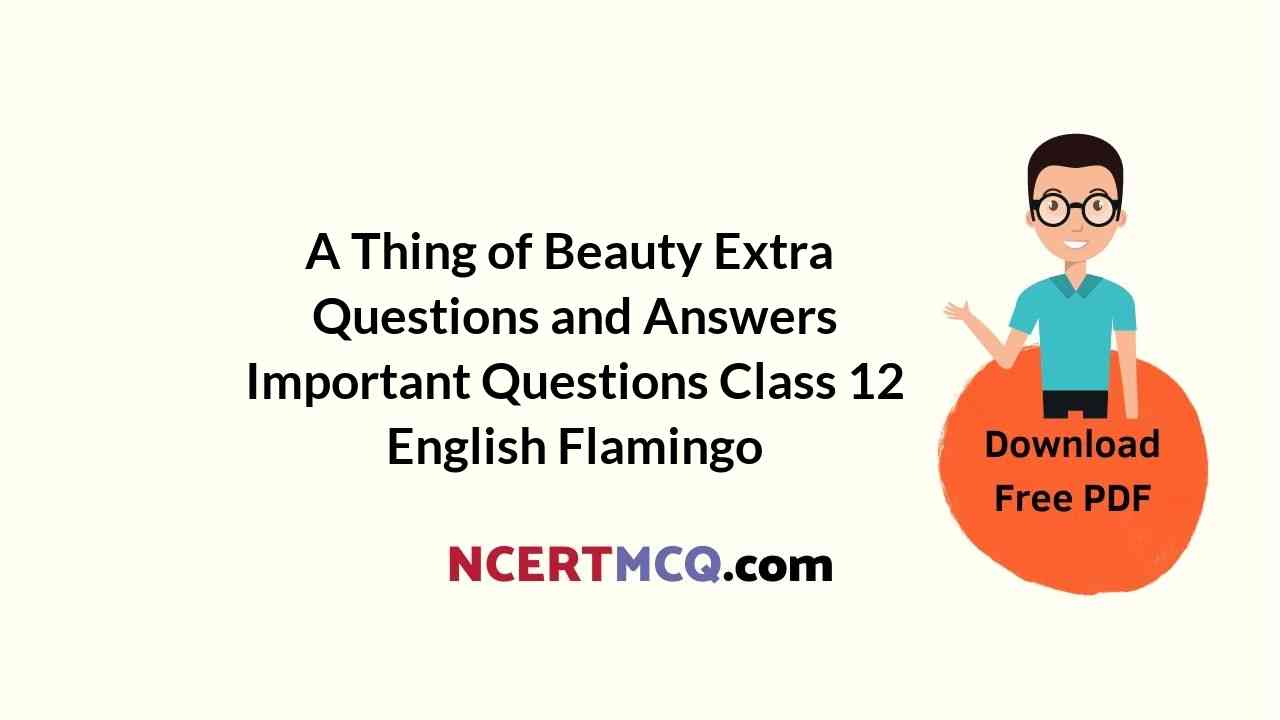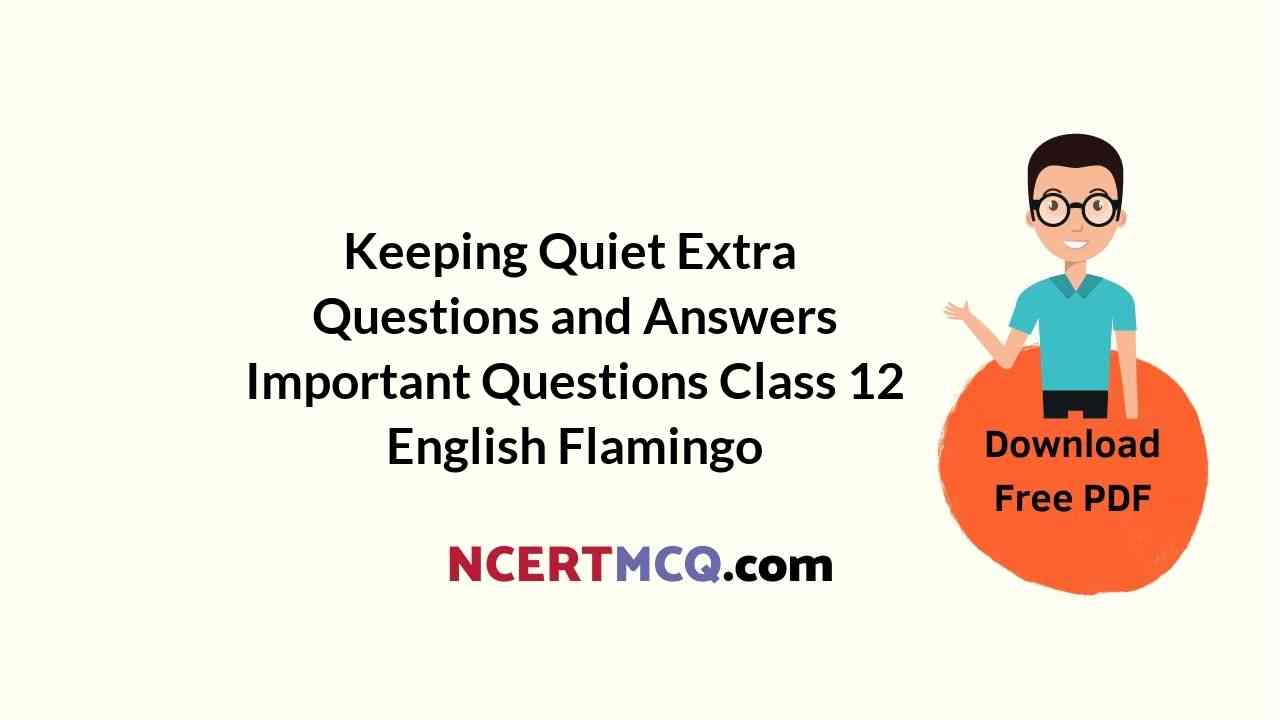Here we are providing Deep Water Extra Questions and Answers Important Questions Class 12 English Flamingo, Extra Questions for Class 12 English was designed by subject expert teachers. https://ncertmcq.com/extra-questions-for-class-12-english/
Deep Water Extra Questions and Answers Important Questions Class 12 English Flamingo
Deep Water Extra Questions and Answers Short Answer Type
Deep Water Extra Questions And Answers Class 12 Question 1.
When did the author decide to learn swimming? Why did he join YMCA pool?
Answer:
The author decided to learn swimming at the age of ten or eleven years. There was a pool at the YMCA that offered that opportunity. The YMCA pool was quite safe. It was only two or three feet deep at the shallow end; and while it was nine feet deep at the other, the drop was gradual.
Deep Water Questions And Answers Class 12 Question 2.
What did the author do to learn swimming at the YMCA pool?
Answer:
The author got a pair of water wings and went to the pool. He paddled with his new water wings, watching the other boys and trying to learn aping them. He did this two or three times on different times on different days and was beginning to feel at ease.
Deep Water Question Answers Class 12 Question 3.
Why did Douglas’ mother recommend that he should learn swimming at the YMCA pool?
Answer:
The author wanted to learn swimming when he was ten or eleven years old. The river Yakima was dangerous. The author’s mother continually warned him against it and kept on telling him the incidents of drowning in it. But the YMCA pool was quite safe. Therefore she recommended YMCA pool to learn swimming.
Deep Water Extract Questions And Answers Class 12 Question 4.
Describe the author’s childhood experience when he was three or four years old?
Answer:
The author had an aversion to the water when he was three or four years old. His father took him to a beach in California. His father and he was standing together in the surf. Suddenly the waves knocked him down and swept over him. He was buried in the water. His breath was gone. This caused a terror in his mind of water.
Deep Water Question Answer Class 12 Question 5.
What happened one day when the author was sitting alone beside the pool?
Answer:
One day the author went to the pool when no one was there. He was timid about going in the pool alone. So he sat on the side of the pool to wait for others. An eighteen year old boy came there and tossed the author into the pool thinking that the author might knew swimming.
Deep Water Class 12 Question Answers Question 6.
How did the big boy throw the author into the pool?
Answer:
The big boy was about eighteen years old. He was a kind of bruiser. He yelled, ‘ Hi, Skinny! How’d you like to be ducked?’ With that he picked the author up and tossed him into the deep end. However, he later said that he was just fooling.
Deep Water Extract Questions Class 12 Question 7.
Describe the appearance of the big boy who tossed the author into the pool?
Answer:
The boy who tossed the author was about eighteen years old. He was a kind of bruiser. He had thick hair on his chest. He was a beautiful physical specimen, with legs and arms that showed rippling muscles.
Deep Water Short Questions And Answers Class 12 Question 8.
What deep meaning did his experience at the YMCA pool have for Douglas?
Answer:
His experience had a deep meaning for him. The author said that who had known stark fear and conquered it could appreciate it. In death, there is peace. There is terror only in the fear of death. The author concludes saying that all we need is to fear itself.
Deep Water Important Questions Class 12 Question 9.
How did Douglas’ introduction to the YMCA pool revive his childhood fear of water?
Answer:
Douglas had aversion for water since his early child¬hood. However, he decided to learn swimming at the age of ten or eleven. But one day he was sitting alone beside the pool. He was sitting for others to come. An eighteen year old boy came there and tossed the author into the pool. He was saved with great difficulty from being drowned. In this way, the introduction to the YMCA pool reinforced the author’s childhood fear of water.
Deep Water Extract Based Questions And Answers Class 12 Question 10.
What did Douglas feel and do when he was pushed into the swimming water?
Answer:
When Douglas was tossed into the water he was frightened but not much. He thought that when he reached the bottom he would make a big jump. Then he would, come to the surface like a cork. It seemed a long way down. He reached the bottom very slow. It appeared to him that those nine feet were like ninety feet, He felt that his lungs would burst.. He came up very slowly. He grew panicky. He thought he would not survive. This thought gave him peace.
Deep Water Very Short Questions And Answers Class 12 Question 11.
How did Douglas’ experience at the YMCA pool affect him?
Answer:
Douglas was saved from drowning. When he came to his senses, he found that he was lying on his stomach beside the pool and he was vomitiftg. After hours later the author walked to his home. He was feeling very weak. He could neither eat nor sleep that night. He never went to the pool again. He avoided it whenever he could.
Deep Water Class 12 Important Questions Question 12.
Why did the author go to Lake Went worth in New Hampshire?
Answer:
The author had learnt swimming from a very capable instructor. But the author wanted to conquer ‘ his fear of water completely. Therefore, he went to Lake Went worth in New Hampshire. He swam across the lake. Only once did his old fear of water return. However he brushed this thought of fear aside and swam across the lake.
Deep Water Question And Answer Class 12 Question 13.
How do you think was Douglas rescued when he was about to be drowned?
Answer:
A big boy threw Douglas into the pool thinking that he knew swimming. But Douglas didn’t know swimming. He was about to be drowned. He lost his senses. When he regained consciousness, he found himself lying beside the pool. Naturally someone saved him who was present there. Most probably, it might be the big boy who threw him into the pool.
Deep Water Extra Questions Class 12 Question 14.
Why did Douglas decide to overcome his fear of water?
Answer:
Due to his fear of water, Douglas couldn’t enjoy any of the water-related activities. It ruined his fishing plans and his joy of boating or canoeing. Therefore he decided to overcome his fear of water.
Extra Questions Of Deep Water Class 12 Question 15.
What sort of terror seized Douglas as he went down the water with a yellow glow? How could he feel that he was still alive?
Answer:
It was. a kind of terror that the person who had experienced could understand. Douglas was about to be drowned in the water. He was crying. He was stiff with fear. Even the cries in his throat were frozen. Only his heart said that he was alive.
Question 16.
The author says, “The instructor was finished. But I was not finished.” Why?
Answer:
The instructor was a very experienced trainer. He trained the author step by step. After about two months of training, he told the author that he now knew everything about swimming. However the author was yet not satisfied. He himself wanted to become assure that he had overcome his fear of water. Therefore the author said that the instructor was finished but not was he.
Question 17.
How did this experience affect him?
Answer:
This experience had a great effect on the author. He never went to the pool again. He feared water. He avoided it whenever possible. It ruined his fishing trips and also deprived him of the joy of canoeing, boating and swimming.
Question 18.
Why was Douglas determined to get over his fear of water?
Answer:
The fear of water ruined Douglas’ all fishing trips and also deprived him of the joy of canoeing, boating and swimming. Therefore, Douglas decided to get over his fear of water.
Deep Water Extra Questions and Answers Long Answer Type
Question 1.
Where did the author decide to learn swimming and why? What did he get to learn swimming?
Answer:
When the author was ten or eleven years old, he decided to learn swimming. There was a pool at the YMCA in Yakima that offered exactly swimming opportunity. The river Yakima was dangerous and many incidents of drowning used to happen there. Thus the author’s mother desist him to go and learn swimming there.
But the YMCA pool was safe. It was only two or three feet at the shallow end; and while it was nine feet deep at the other. The drop was gradual. The author got a pair of water wings and went to the pool. The author paddled with his new water wings, watching the other and trying to learn by imitating them. He did this two or three times on different days and started to feel at ease in the water.
Question 2.
Roosevelt said, “All we have to fear is fear itself.” Do you agree? Why/why not?
Answer:
Once the American President Roosevelt had said, “All we have to fear is fear itself.” This quote by the President is absolutely right. Almost all great per¬sons believe in this. Mahatma Gandhi had similar views. That was why he was not afraid of the British tyrannical power. In this text the author was about to be drowned.
He became quite afraid when he thought he would not survive. He tried his best to safe himself for drowning but all in vain. Then he accepted his fate. Now he felt at peace. And he was ready to welcome death calmly. However he was saved from being drowned. After that, he decided to overcome his fear of water. He did this with the help of a very capable instructor.
The author’s experience about his misadventure with water had a very deep meaning for him. According to him only those who had known stark terror and conquered it could appreciate it. He said in death there is peace. There is terror only in the fear of death.
Question 3.
Desire, determination and diligence lead to ‘ success. Explain the value of these qualities in the light of Douglas’ experience in ‘Deep Water’?
Answer:
The author had childhood fear of water. When he was just four years old, he was knocked down by the sea waves. This experience caused in him an aversion for water. When he was ten or eleven years old he was nearly drowned in the YMCA pool. His life was saved with great difficulty. Thus, he started avoiding water. It resulted in ruining all his water- related activities viz fishing, boating and canoeing.
The author decided to overcome or fight this fear. He took the help of a very capable instructor. The instructor perfected the author in the art of swimming in about two months. Though the instructor was finished yet not the author. When he swam the length and breadth of the pool, the old memories of terror would return.
One day,the author went to Lake Went worth in New Hampshire. He swam two miles across the lake. Only once did the old terror returned to him. Once the author went across the Warm Lake. He dived into the lake next morning. He swam across to the other shore. The author shouted with joy. He had conquered his old fer of water. It was the result of sheer determination and diligence on part of the author that he was able to overcome his fear of water.
Question 4.
How did the instructor make Douglas a good swimmer?
Answer:
Douglas wanted to overcome his fear of water. He got an instructor to teach him swimming. He went 1 to the pool for five days a week, an hours each day. The instructor put a belt around him. A rope attached to the belt went through a pulley that ran on an overhead cable. He held on to the end of the rope, and went back and forth, across the pool, hour after hour, day after day, week after week. On each trip across the pool a bit of his panic seized him.
Each time the instructor relaxed his hold on the rope and the author went under water, some of the old terror returned and his legs froze. After three months, the instructor taught him to put his face under water and exhale, and to raise his nose and inhale. He repeated this exercise hundreds of times. Bit by bit, the author shed the part of the panic that seized him when his head went under water.
Next, the instructor held the author at the side of the pool and had him kick with his legs. At first, it was quite difficult for the author but gradually he was able to command his legs. Thus, piece by piece the instructor made Douglas a good swimmer.
Question 5.
Which two incidents in Douglas’ early life made him scared of water?
Answer:
There happened two incidents in Douglas’ life that made him scared of water. The first incident occurred when the author was just three or four years old and his father took him to the beach in California. He and his father stood together in the surf. The waves knocked him down and swept over him. He was buried in water. His breath was gone. He was frightened.
However the author decided to learn swimming. He joined the YMCA pool. One day there was nobody at the pool. He was waiting for others to come. An eighteen year old boy came there and tossed the author into the pool. He was saved with great difficulty from being drowned. In this way that second incident reinforced the author’s fear of water.
Question 6.
A big boy threw Douglas Into the swimming pool. How did this experience affect Douglas?
Answer:
Douglas was sitting atone beside the pool. didn’t want to go into the pool alone. A big boy came there and tossed the author into the pool. Douglas was saved from drowning with great effort. When he came to his senses, he found that he was lying on his stomach beside the pool and he was vomiting. After hours later the author walked to his home he was feeling very weak. He could neither eat nor sleep that night. He never went to the pool again.
The author would also avoid any water-related activities. This ruined all his fishing trips, his boating or canoeing activities. In the end the author decided to engage a very capable instructor to teach him swimming. And in the span of two months the author became a good swimmer.
Question 7.
Justify the title ‘Deep Water’.
Answer:
This story is about a deep and profound meaning of life. That meaning can be summed up in the author’s statement that there is no fear in death; there is fear .in fear itself. One has to kill that fear in oneself if one wants to enjoy a fuller and meaningful life. The author had a great fear of water.
A couple of his childhood experiences had caused that fear in himself. But with the help of an instructor he was able to overcome this fear. He shouted in joy when he realised that he had overcome his fear of water.
The author had experienced both the sensation of dying and the terror that fear of it can produce. The author learned a very profound and deep meaning of life. He realised that there is no fear in death. The fear is in fear itself. One has to overcome this fear. Thus to conclude with we can say that the title of the story is quite apt.
Question 8.
What is the misadventure that William Douglas speaks about?
Answer:
The author William Douglas joined YMCA pool to learn swimming. One day he was sitting alone on the side of the pool. He was afraid to go inside the pool without anyone’s presence. So, he decided to wait for others. There came a boy of about eighteen. He was a kind of bruiser. He yelled, ‘ Hi skinny! How’d you like to be ducked? He picked the author and threw him into the water. The author at once went to the bottom of the pool.
The author was frightened but not much. He imagined that he would bob to the surface like a cork. Instead he came very slowly. He could see nobody. The author grew very panicky. He tried to jump upwards twice but all proved futile. At last, he stopped all is efforts. He relaxed. Even his legs felt limp. But he was taken out of the water before he was dead. He walked to his house several hours later.
Question 9.
What were the series of emotions and fears that Douglas experienced when he was thrown into the pool? What plans did he make to come to the surface?
Answer:
The author was not frightened much in the begining. He thought that his feet would touch the bot-tom and he would come to the surface like a cork. But instead, he came to the surface very slow. The depth of nine feet appeared ninety feet to him. He grew panicky. He was suffocating. He called for help but no one was there to help him. When he came to the surface, he started going down again. This thing happened three times.
Then he stopped all his efforts. He was sure that he was not going to Survive. This thought gave him peace. He relaxed. Now he was no more panic. Everything blanked out. The curtain of life fell. Next he remembered he was lying beside the pool. In this way, the author was saved from his dying. The author experienced near death experience.
Question 10.
How did the instructor ‘build a swimmer’ out of Douglas?
Answer:
Douglas wanted to overcome his fear of water. He got an instructor to teach him swimming. He went to the pool for five days a week, an hour each day. The instructor put a belt around him. A rope attached to the belt went through a pulley that ran on an overhead cable. He held on to the end of the rope, and went back and forth, across the pool, hour after hour, day after day, week after week. On each trip across the pool, a bit of his panic seized him.
Each time the instructor relaxed his hold on the rope and the author went under the water, some of the old terror returned and his legs froze.
After three months, the instructor taught him to put his face under water and exhale, and to raise his nose and inhale. He repeated this exercise hundreds of times. Bit by bit the author shed the part of the panic that seized him when his head went under water. Next the instructor held the author at the side of the pool and had him kick with his legs. At first it was quite difficult for the author but gradually he was able to command his legs. Thus, piece by piece the instructor build a swimmer out of Douglas.
Question 11.
How did Douglas make sure that he had conquered the old terror?
Answer:
The author learnt swimming from an expert instructor. Finally, the instructor told him that he had learnt swimming. The instructor was finished but not the author. When he swam the length and breadth of the pool, the old memories of terror would return. One day, the author went to Lake Went worth in New Hampshire.
He swam two miles across the lake. Only once did the old terror returned to him. Once the author went across the Warm Lake. He dived into the lake next morning. He swam across to the other shore. The author shouted with joy. He had conquered his old fear of water.
Question 12.
How does Douglas make clear to the reader the sense of panic that gripped him as he almost drowned? Describe the details that have made the description vivid.
Answer:
In this extract, the author vividly describes his experience when he was almost drowned and also when he was saved. The author decided to learn swimming at the YMCA pool. One day a misadventure happened with the author. An eighteen year old boy tossed the author into the pool thinking that the author might know how to swim. But the author didn’t know swimming at all. The author landed in a sitting position. He was frightened but not much. He thought that when he reached the bottom he would make a big jump. Then he would come to the surface like a cork.
It seemed a long way down. He reached the bottom very slow. It appeared to the narrator that those nine feet were like ninety feet. The narrator felt that his lungs would burst. He came up very slowly. He grew panicky. He thought he would not survive. This thought gave him peace. He closed his eyes. He became unconscious. The next he remembered he was lying on his stomach beside the pool and he was vomiting.
The boy who had thrown him inside the pool said that he was just fooling. After hours later the author walked to his home feeling very weak. He could neither eat nor sleep that night. He never went to the pool again. He avoided it whenever he could.
Question 13.
How did Douglas overcome his fear of water?
Answer:
The author, Douglas,-had great fear of water. In order to get over this fear he decided to take training from an expert instructor. After two months the instructor told him that now he could swim without any fear. Though the instructor was finished yet not the author. When he swam the length and breadth of the pool, the old memories of terror would return.
One day the author went to Lake Went worth in New Hampshire. He swam two miles across the lake. Only once did the old terror returned to him. Once the author went across the Warm Lake. He dived into the lake next morning. He swam across to the other shore. The author shouted with joy. He had conquered his old fear of water.
Question 14.
Why does Douglas as an adult recount a childhood experience of terror and his conquering of it? What larger meaning does he draw from this experience?
Answer:
The author had an aversion to water from his early childhood. When he was three or four years old he was knocked by water waves on a beach. One day he was saved with great difficulty from being drowned. But the author decided to overcome his fear of water.
With the help of an instructor he was able to overcome this fear, His experience had a deep meaning for him. The author said that who had known stark fear and conquered it could appreciate it. In death there is peace. There is terror only in the fear of death. The author concludes saying that all we need is to fear itself.
Deep Water Extra Questions and Answers Extract Based
Read the following paragraph and answer the questions that follow:
(Para-1)
My introduction to the Y.M.C.A. swimming pool revived unpleasant memories and stirred childish fears. But in a little while I gathered confidence. I paddled with my new water wings, watching the other boys and trying to learn by aping them. I did this two or three times on different days and was just beginning to feel at ease in the water when the misadventure happened.
Questions :
(a) What does Y.M.C.A. stand for ?
(b) What are narrator’s unpleasant memories and child ish fears ?
(c) After gathering confidence, what did the narrator do ?
(d) What was the misadventure, narrator faced ?
Answers :
(a) Y.M.C.A. stands for “Young Men’s Christian Association’.
(b) Narrators unpleasant memories and childish fears were the moments of his childhood when he was drowned by the powerful waves at the beach of California.
(c) After gathering confidence, the narrator paddled with his new little wings, watching the other boys and trying to learn by aping them.
(d) Narrator faced the misadventure of drowning into the swimming pool when a big bruiser of a boy threw him into the pool just for fun.
(Para-2)
It seemed a long way down. Those nine feet were more like ninety, and before I touched bottom my lungs were ready to burst. But when my feet hit bottom I summoned all my strength and made what I thought was a great spring upwards. I imagined I would bob to the surface like a cork. Instead, I came up slowly. I opened my eyes and saw nothing but water – water that had a dirty yellow tinge to it. I grew panicky. I reached up as if to grab a rope and my hands clutched only at water. I was suffocating. I tried to yell but no sound came out. Then my eyes and nose came out of the water but not my mouth.
Questions :
(a) Nine feet were more than ninety, why ?
(b) What did the narrator do when he reached to the bot-tom ?
(c) What happened when he came upwards ?
(d) What did he try when came outside the water first ?
Answers :
(a) Nine feet were more than ninety because the narrator didn’t know swimming and it was his first experience into the router.
(b) The narrator when reached to the bottom shrouded all his strength and made a great spring upwards, but all in vain.
(c) Though he imagined that he would bob to the surface lice a cork but he came up storoly, saw nothing but water-water with a dirty yellow tinge everywhere.
(d) After outside the water first, he grow panicky tried to grab a rope but clutched only at water, tried to yell but no sound out.
(Para-3)
And then sheer, stark terror seized me, terror that knows no understanding, terror that knows no control, terror that no one can understand who has not experienced it. I was shrieking under water. I was paralysed under water—stiff, rigid with fear. Even the screams in my throat were frozen. Only my heart and the pounding in my head, said that I was still alive.
Questions :
(a) What do you understand by sheer, stark terror ?
(b) Why and how the writer was paralysed ?
(c) How did the narrator come to know that he was alive ?
(d) Name the chapter and it’s writer.
Answers :
(a) Sheer, stark terror here signifies that a terror that is straight, complete and absolutely violent. A terror that can’t be overcome easily.
(b) The writer was paralysed because he was under water as he was thrown by a big boy and nearly drowning and due to fear he was unable to even move his legs and hands.
(c) Feeling the fast heart beats and only the pounding in his head, made him realize that he was still alive.
(d) The chapter’s name is ‘Deep Water’ written by William Douglas.
(Para-4)
The next I remember I was lying on my stomach be-side the pool, vomiting. The chap that threw me in was saying, “But I was only fooling”. Someone said, “The kid nearly died. Be all right now. Let’s carry him to the locker room.”
Several hours later, I walked home. I was weak and trembling. I shook and cried when I lay on my bed. I couldn’t eat that night. For days a haunting fear was in my heart. The slightest exertion upset me, making me wobbly in the knees and sick to my stomach. I never went back to the pool. I feared water, I avoided it whenever I could.
Questions :
(a) What was the chap’s reaction on his deed ?
(b) Why, when laying on the bed, narrator cried ?
(c) What physical problems did he face after recovery ?
(d) How did he take that incident ?
Answers:
(a) The chap who threw him in was simply saying, “But I was only fooling”. He was very normal and taking that fatal incident so ordinarily.
(b) When laying on the bed, narrator cried because he was very weak, trembling and having an intense pain in his stomach.
(c) After recovery, he felt very weak, couldn’t stand as he was trembling, couldn’t eat the food, even the slightest exertion upset him, making him wobbly in the knees and sick to his stomach.
(d) After that incident, he never went back to the pool, he feared water and avoided it whenever he could.
(Para-5)
The experience had a deep meaning for me, as only those who have known stark terror and conquered it can appreciate. In death there is peace. There is terror only in the fear of death, as Roosevelt knew when he said, “All we have to fear is fear itself.” Because I had experienced both the sensation of dying and the terror that fear of it can produce, the will to live somehow grew in intensity.
At last I felt released free to walk the trails and climb the peaks and to brush aside fear.
Questions :
(a) What place that experience had in Douglas’s life ?
(b) What did Roosevelt say ?
(c) What type of experience did Douglas have ?
(d) When did the writer feel released ?
Answers :
(a) That experience had a deep meaning in his life and only those who have known stark terror and conquered it can appreciate.
(b) Roosevelt said, “All we have to fear is fear itself’.
(c) Douglas had the experience of both the sensation of dying and the terror that fear of it can produce.
(d) At last, the writer felt released free to walk the trails and climb the peaks.










